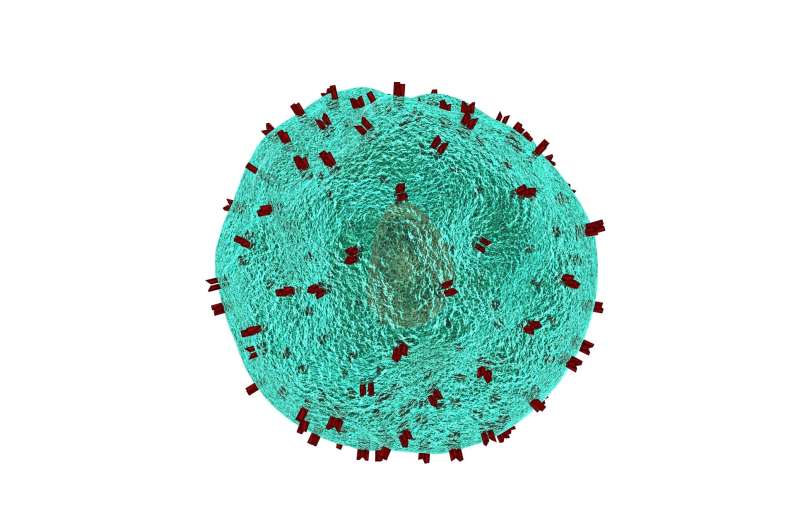This article has been reviewed according to Science X's editorial process and policies. Editors have highlighted the following attributes while ensuring the content's credibility:
fact-checked
peer-reviewed publication
trusted source
proofread
CAR T cell therapy for T cell lymphoma shows promise in phase I trial

Researchers at the Center for Cell and Gene Therapy at Baylor College of Medicine, Texas Children's Hospital, and Houston Methodist Hospital have developed a chimeric antigen receptor (CAR) T-cell therapy targeting T-cell lymphoma, an aggressive and difficult-to-treat cancer.
A first-in-human phase I clinical trial of patients with relapsed or refractory T-cell lymphoma found early signals of anti-tumor efficacy and safety. The results are published in the journal Blood Journal.
All patients in the trial were treated extensively with other therapies prior to treatment with the investigational CAR T cells. Clinical responses were observed in four out of nine patients (44%), with two patients achieving complete responses. A third patient had an initial mixed response, received a second infusion of CAR T cells, and proceeded to allogeneic hematopoietic stem cell transplantation.
The patient is currently in remission, almost five years after CAR T cell treatment. A fourth patient had a partial response. There were no severe side effects, and the most common side effect, cytopenias, was mostly self-resolved.
"These findings are very encouraging. We have shown that it is feasible to target T cell malignancy with CAR T cell therapy. This treatment has a very good safety profile with few severe toxicities. Patients are able to receive the therapy in the outpatient setting, and they don't feel very sick as a result of treatment," said Dr. LaQuisa Hill, first author of the study and associate professor at the Center for Cell and Gene Therapy. Hill also is a member of Baylor's Dan L Duncan Comprehensive Cancer Center.
Patients with relapsed or refractory T cell lymphoma or leukemia have a poor prognosis because currently available therapies often are not effective long-term. CAR T cell therapies have shown remarkable efficacy in B cell malignancies, with six CAR-T products now commercially available, but none have been approved in T cell malignancies.
"Developing a CAR T cell therapy for T cell lymphomas has been challenging because the same engineered receptors that recognize the tumor can also target normal T-cells," said Dr. Maksim Mamonkin, senior author of the study, associate professor in the Center for Cell and Gene Therapy and member of the Dan L Duncan Comprehensive Cancer Center at Baylor.
"That increases the risk of CAR T cells killing each other before they see the cancer cells. There's also a possibility these CAR T cells will deplete the normal T cells circulating in the body, creating dangerous immunosuppression. Both of these limitations were overcome with our targeting approach."
The CAR T cell therapy in this phase I trial uses the patient's own T cells, modified in the lab to target the CD5 protein, which is highly expressed in T cell lymphoma and in normal T cells. In preclinical studies, researchers found that the CD5-specific CAR T cells did not eliminate themselves due to the rapid degradation of CD5 protein, making CAR T cells invisible to each other and free to target tumors.
"We have only seen this outcome when targeting CD5, but not with any other antigen," Mamonkin said. "This finding in the laboratory was accidental, and it turned out to be very serendipitous."
Researchers modified the manufacturing process during the trial based on patients' results. They shortened the manufacturing time for the CAR T cells, increasing the therapy's potency. Patients who responded to treatment were all treated with CAR T cells made with the modified manufacturing process.
"We have found a straightforward way to generate CD5 CAR T cells without additional engineering while producing the most benefit in patients without effective therapy options," Mamonkin said.
The therapy has been licensed to March Biosciences and will be evaluated in a larger multicenter phase II trial to be opened in the second half of 2024. Meanwhile, the phase I trial will remain open and is still recruiting patients.
"We encourage patients to enroll as early in their treatment as possible after failure of one to two lines of therapy," Hill said. "We know that the more chemotherapy patients receive, the lower the quality of their T cells. If patients are treated earlier in the disease course, both patients and their T cells will be 'more fit,' which may further improve outcomes."
More information: LaQuisa C. Hill et al, Anti-tumor Efficacy and Safety of Unedited Autologous CD5.CAR T cells in Relapsed/Refractory Mature T-cell Lymphomas, Blood Journal (2023). DOI: 10.1182/blood.2023022204
















